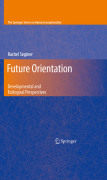
Where am I going? What do I want to do with my life? Such questions are typical of, even essential to, adolescence and continue to influence individuals throughout their lifetimes. And although human beings are capable of anticipating future events even as infants, the teen years are the peak period for weighing options and setting long-range goals. Future Orientation: Development and Ecological Perspectives synthesizes a wealth of theory and empirical data to explore future thinking as both a developmental process and an individual one. Starting with its origins in childhood, the book identifies the forces that affect this evolution, from early interactions with parents to personality traitsand self-processes. Examines future orientation as an aspect of positive psychology, focusing on the stages of preadolescence, adolescence, and emerging adulthood Highlights the relationship between future orientation and other psychological constructs (e.g., self-esteem, loneliness, identity, and intimacy) particularly relevant to these age periods INDICE: Future Orientation: A Conceptual Framework.- The Evolution of Future Orientation from Infancy to Early and Middle Childhood.- Future Orientationin Personality Contexts.- How Gender Affects Future Orientation in Different Cultural Contexts.- The Affect of Parenting on Future Orientation.- The Parenting Mediating Model: The Pivotal Role of the Self.- The Affect of Contemporaries: Siblings and Peers.- Future Orientation Outcomes.- Summary, Conclusions, and Future Directions for Research and Youth Programs.- Appendix: The Assessment and Coding of Future Orientation.
- ISBN: 978-0-387-88640-4
- Editorial: Springer
- Encuadernacion: Cartoné
- Páginas: 315
- Fecha Publicación: 01/03/2009
- Nº Volúmenes: 1
- Idioma: Inglés
